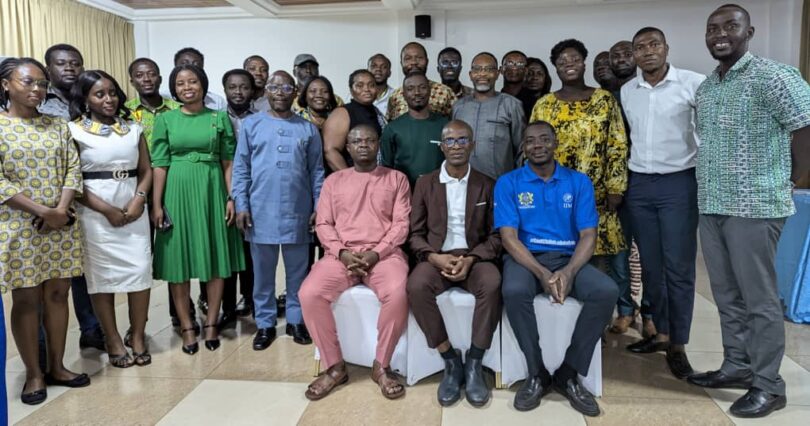Article By: Lucy Baagyei-Danso & Ishmael Barfi
Ghana’s recent ratification of the International Labour Organisation (ILO) Convention 188 marks a significant milestone for the country’s fishing industry, with far-reaching implications for fishers and other stakeholders along the value chain.
The Work in Fishing Convention, 2007 (No. 188), aims to ensure that fishers enjoy decent working conditions, including fair wages, safe working environments, and protection against exploitation.
For Ghanaian fishers, this ratification promises improved labour rights, which have long been absent in the sector. Fishers will benefit from regulated working hours, enhanced safety measures, and fair remuneration that aligns with international standards.
This is especially critical in reducing the prevalence of dangerous and exploitative labour practices, including forced labour and child labour, which have plagued the industry.
Moreover, the ratification has broader implications for other actors within the fishing value chain, including vessel owners, fish processors, and government regulators.
It compels stakeholders to adhere to higher safety and labor standards, thus improving the overall health of the industry. Additionally, by aligning local regulations with international conventions, Ghana strengthens its fishing sector’s competitiveness on the global stage, potentially leading to new market opportunities and increased investment.
A New Era for Fishers in Ghana
To support this historic step, the ILO recently organized a four-day capacity-building workshop for journalists working within the fishing sector. The workshop emphasized the critical role that the media plays in holding the government accountable to its obligations under the ILO Convention 188.
By equipping journalists with the tools to scrutinize policies and practices, the workshop reinforced the need for effective implementation of measures to guarantee decent work for Ghana’s fishers.
The Work in Fishing Convention, 2007 (No. 188), established by the ILO, sets global standards for ensuring decent working conditions on fishing vessels. Ghana’s ratification of this convention on August 28, 2024, is a clear demonstration of the country’s commitment to protecting the rights of those who contribute to its fishing industry.
The training provided to media professionals during the four-day program focused on the 15 provisions of the convention, encompassing more than 30 articles that regulate key aspects such as safety, wages, and working hours on fishing vessels.
The ratification mandates that these standards now be upheld within the Ghanaian fishing industry, ensuring that fishers can work under safe and regulated conditions, free from the dangers of forced labour and child labour.
Moreover, the convention seeks to harmonize Ghana’s local standards, including those enshrined in the Ghana Shipping Act 2003 (Act 645), with international best practices, ensuring the safety of fishers both onshore and at sea.
The Role of the Media in Advocating for Decent Work
The success of Ghana’s ratification of ILO Convention 188 depends significantly on the media’s role in promoting labour rights and advocating for reforms. Media organizations serve as crucial watchdogs in the enforcement of policies aimed at improving working conditions.
By exposing exploitation, unsafe practices, and unfair treatment within the industry, journalists can help bring the necessary changes that ensure decent work for fishers.
Investigative journalism, in particular, has a pivotal role in shedding light on hidden abuses and amplifying the voices of those affected. Personal stories from fishers—highlighting their struggles and challenges—can influence public opinion and spur policy reforms.

Group picture of Journalists at the just ended four-day Capacity Building Workshop at Takoradi
Furthermore, the media has a responsibility to hold institutions like the Ghana Maritime Authority accountable for ensuring that the policies set forth by the government align with ILO Convention 188.
This requires vigilance in tracking whether regulations are enforced and whether stakeholders in the fishing industry are compliant with both local laws and international standards.
As the fourth estate, the media is empowered by Ghana’s 1992 Constitution to promote policy changes and advocate for better working conditions.
The collective efforts of journalists, civil society, and labour unions can drive a transformative shift in Ghana’s fishing industry, ensuring that the ratification of ILO Convention 188 benefits not only the workers but also the communities that depend on the sector for their livelihood.
Strengthening Media-Labor Partnerships
Moving forward, it is essential to foster strong partnerships between the media and labour organizations. Collaborative efforts will enhance reporting on labour rights and enable more effective advocacy for decent work within the fishing industry.
The recent capacity-building workshop, organized by the ILO, is a commendable step in this direction. It highlights the importance of empowering the media with the knowledge and skills necessary to advocate for the rights of fishers and ensure that the ratification of ILO C188 is more than just a symbolic gesture.
The ILO recognizes the vital role of the media in this ongoing process. For the government’s ratification of the convention to have a lasting impact, policies, laws, and enforcement mechanisms must be robust and practical.
The media’s role in promoting accountability will be instrumental in ensuring that decent work becomes a reality for Ghana’s fishers, transforming their lives and the industry at large.
Ultimately, Ghana’s ratification of ILO C188 is a critical step toward creating a more sustainable and ethical fishing industry, where workers’ rights are respected, and the sector is positioned for long-term growth and success.
Source: www.thenewindependentonline.com








